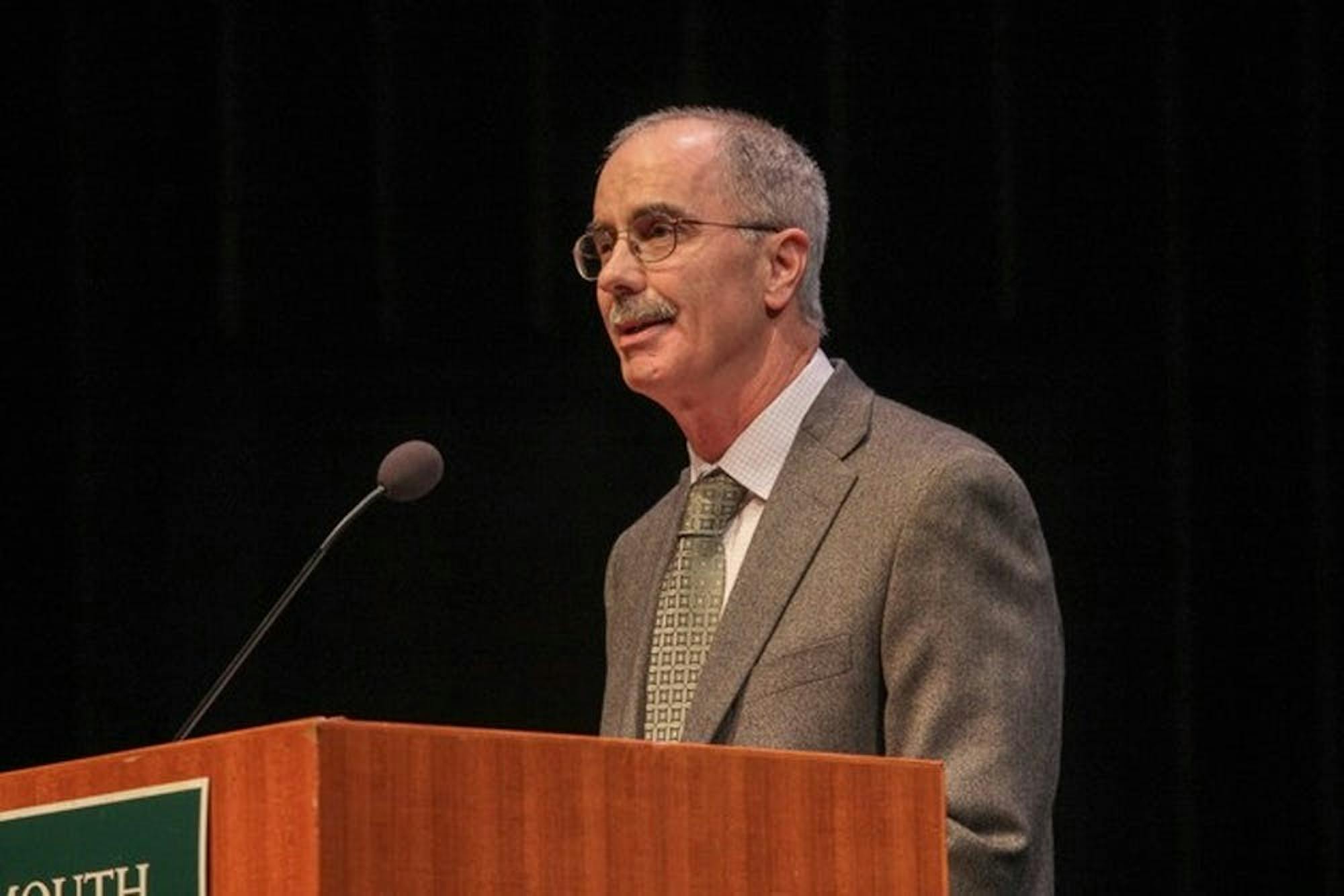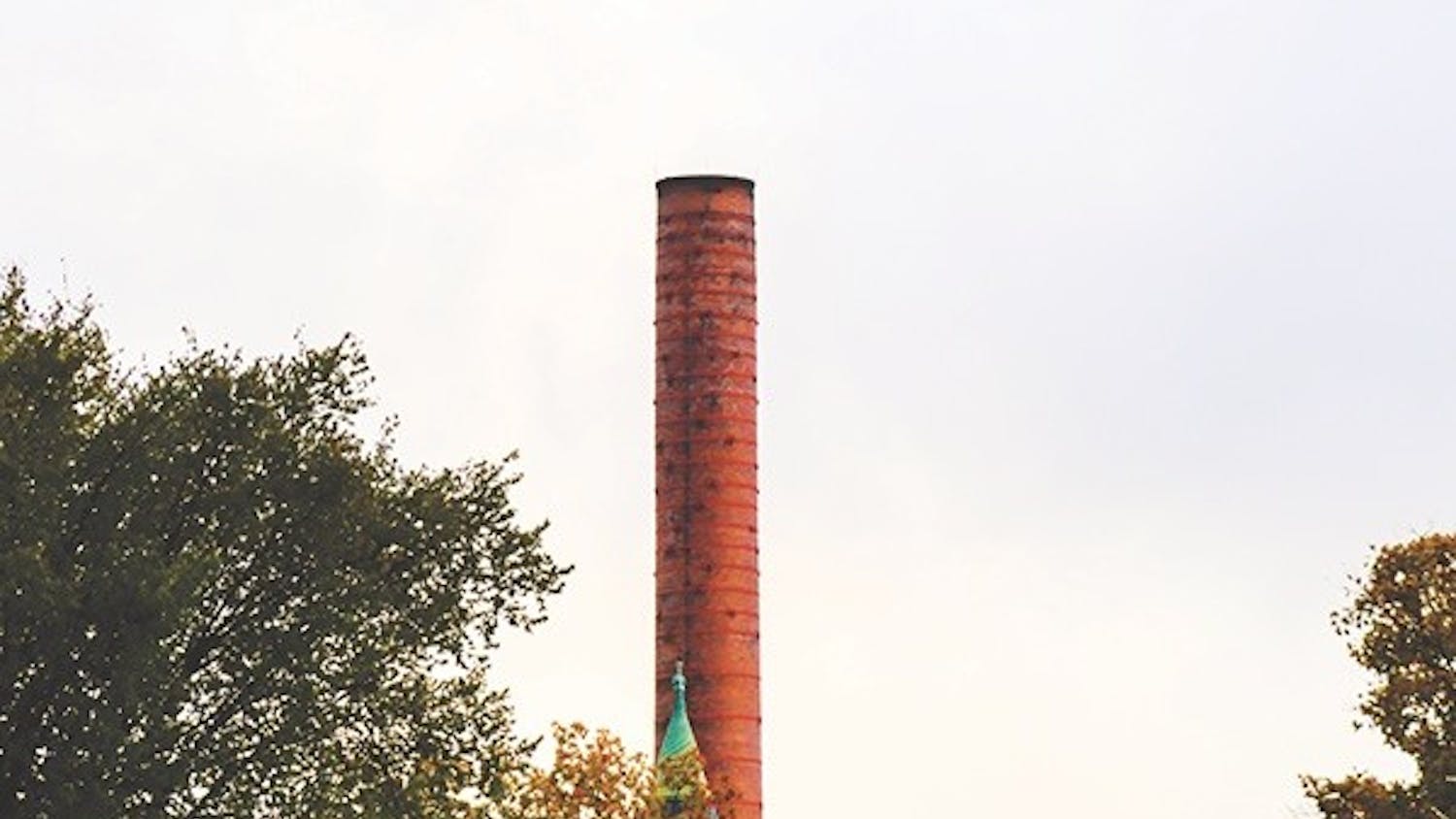On Monday, College President Phil Hanlon delivered his annual “State of the College” address in the Grand Ballroom at the Hanover Inn. The purpose of his speech was to discuss the current position of the College and its trajectory over the past few years.
In his address, Hanlon discussed a wide range of topics, including efforts to expand the team of admissions officers, financial sustainability, environmental projects, improvements to the Campus Climate and Culture Initiative and research by faculty members.
“The external recognition of your impressive accomplishments in this realm have been accelerating during my time as president,” Hanlon said when recognizing faculty contributions.
Among the professors that Hanlon recognized were economics professor Ellen Meara, who was recently elected to the National Academy of Medicine; engineering professor Fridon Schubitidze, who earned the Presidential Medal of Honor from the country of Georgia; and anthropology professor Sienna Craig, who was awarded a Guggenheim Fellowship in 2018 for her book, “The Ends of Kinship.”
In addition to recognizing faculty contributions, Hanlon spoke about the tuition costs that students and families pay, comparing the affordability of Dartmouth to other Ivy League colleges and other peer institutions.
“We have contained tuition growth over these past six years to the lowest six-year percentage increase since the 1950s,” Hanlon said. “In doing so, Dartmouth has dropped from the second-most expensive in the Ivy-plus group when I arrived, to the eighth-most expensive today.”
Hanlon also talked about the ongoing construction of other facilities across campus, which he said would enable better accommodations for students, faculty and staff.
In his speech, Hanlon referenced the set of infrastructural challenges the College faced when he first assumed office in 2013. He recalled that “critical buildings,” such as Dartmouth Row, the Hopkins Center and many residential halls were aging. Additionally, he mentioned that many of the College’s 35 athletic teams were “crammed into Leverone Field House,” and that the power plant continued to burn fuel oil, while the College’s steam tunnels were deteriorating.
However, Hanlon said that some of these challenges have been addressed through the renovation of Dana Hall, which, upon completion, will be followed by the renovation of Dartmouth Hall; the construction of the Indoor Practice Facility, which will be complete by early next year; and the replacement of the steam tunnels with a hot water delivery system.
The financial sustainability of the College was also one of the focal points of Hanlon’s speech, which culminated with his announcement of the Dartmouth Budget Project, which he described as a “concentrated effort to develop recommendations for our campus in three areas.”
Hanlon outlined the three areas as discovering new ways to generate new net revenues, re-thinking the College’s cost base and finding more ways to engage with the campus by keeping the community informed of the College’s progress.
“The Dartmouth Budget Project is about anticipating the challenges ahead and preparing to adapt accordingly,” Hanlon said.
In an interview with The Dartmouth after Hanlon’s speech, sustainability director Rosalie Kerr ’98 discussed programs the office is working on with regard to environmental sustainability, which Hanlon also mentioned in his speech.
“The sustainability office is really expanding its programs for students interested in environment, as well as for the College at-large,” Kerr said. “Focus on sustainability by giving students hands-on experience is one of the best ways to motivate the community.”
She also discussed how internship opportunities have provided a broader scope for students to have a real understanding of sustainability.
“For example, we support sustainable learning in the form of going to and researching in the organic farms; internships in all ways for sophomores, juniors and seniors, as well as a first-year program for students to pursue environmental understanding,” Kerr said.
The Dartmouth Green Energy project is also an essential part of the sustainability project that Kerr discussed.
“This project is a $200 million initiative in hopes to change the way Dartmouth deals with sustainability,” Kerr said. “By building new heating facilities and distributing hot water in a more environmentally conscious way, Dartmouth can achieve its promise.”
In addition to Kerr, Melissa Weinstein, communications manager at the Arthur L. Irving Institute for Energy and Society, gave insights about the roles of the new institute in achieving sustainability at the College in an interview with The Dartmouth after Hanlon’s speech.
“Our mission really is to help change the world and make the world a better place, by helping to teach students and bring people together to create pathways towards the future where energy is affordable, sustainable and reliable,” Weinstein said.
Weinstein also discussed the mission of the Institute by elaborating on the programs the Irving Institute offers.
“We have a vision in the education space, which we engage with Dartmouth students, both in the undergraduate and graduate level,” Weinstein said. “On the research side of things, we started with small number of faculty that helps us to jump into energy in a multidisciplinary way across academic departments, because we can work more creatively with the idea of energy.”
Hanlon ended his speech on an optimistic note, emphasizing the current financial position of the College.
“As a campus, we have achieved so much over the past six years to strengthen our finances,” Hanlon said. “And I’m confident that if we stay focused on the challenges ahead, we will take the steps necessary to keep us financially strong and with the resources we need to invest in excellence in the years ahead.”



